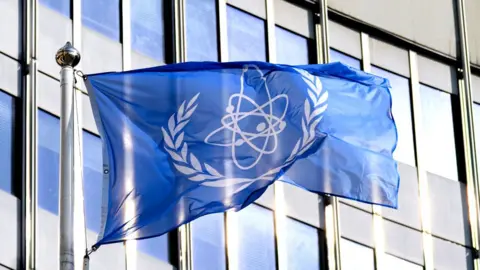Global watchdog finds Iran failing to meet nuclear obligations
 EPA
EPAThe global nuclear watchdog's board of governors has formally declared Iran in breach of its non-proliferation obligations for the first time in 20 years.
Nineteen of the 35 countries on the board of the International Atomic Energy Agency (IAEA) voted for the motion, which was backed by the US, UK, France and Germany.
It says Iran's "many failures" to provide the IAEA with full answers about its undeclared nuclear material and activities constitutes non-compliance. It also expresses concern about Iran's stockpile of enriched uranium, which can be used to make reactor fuel but also nuclear weapons.
Iran condemned the resolution as "political" and said it would open a new enrichment facility.
It follows a report from the IAEA last week which criticised Iran's "general lack of co-operation" and said it had enough uranium enriched to 60% purity, near weapons grade, to potentially make nine nuclear bombs.
Iran insists its nuclear activities are entirely peaceful and that it would never seek to develop or acquire nuclear weapons.
Under a landmark 2015 deal with six world powers, Iran agreed to limit its nuclear activities and allow continuous and robust monitoring by the IAEA's inspectors in return for relief from crippling economic sanctions.
Iran also committed to help the IAEA resolve outstanding questions about the declarations under its Nuclear Non-Proliferation Treaty (NPT) Safeguards Agreement.
However, US President Donald Trump abandoned the agreement during his first term in 2018, saying it did too little to stop a pathway to a bomb, and reinstated US sanctions.
Since 2019, Iran has increasingly breached restrictions of the existing nuclear deal in retaliation, particularly those relating to production of enriched uranium.
Diplomats said three countries - Russia, China and Burkina Faso - voted against the resolution at the IAEA board's meeting in Vienna. Eleven others abstained and two did not vote.
The text, seen by the BBC, says the board "deeply regrets" that Iran has "failed to co-operate fully with the agency, as required by its Safeguards Agreement".
"Iran's many failures to uphold its obligations since 2019 to provide the agency with full and timely co-operation regarding undeclared nuclear material and activities at multiple undeclared locations in Iran... constitutes non-compliance with its obligations," it adds.
As a result, it says, the IAEA is "not able to verify that there has been no diversion of nuclear material required to be safeguarded". The "inability... to provide assurance that Iran's nuclear programme is exclusively peaceful," it adds, "gives rise to questions that are within the competence of the United Nations Security Council".
The issue could now be referred to the Security Council, which has the power to "snap back" the UN sanctions lifted under the 2015 deal if Iran fails to fulfil its obligations. European powers have said that could happen later this year unless Iran reverses course.
France, Germany, the UK and US said in a joint statement that the board's action "creates an opportunity Iran should seize".
"Iran still has a chance to finally fulfil its obligations, in full candour, and answer the IAEA's crucial, longstanding questions on undeclared nuclear material and activities," they added.
But the Atomic Energy Organisation of Iran (AEOI) and the Iranian foreign ministry condemned the "political action" by countries who voted in favour of the resolution and insisting that it was "without technical and legal basis".
They announced that Iran would respond by setting up a new uranium enrichment facility at a "secure location" and by replacing first-generation centrifuges used to enrich uranium with more advanced, sixth-generation machines at the underground Fordo facility.
"Other measures are also being planned," they added.
Iran's Foreign Minister, Abbas Araghchi, said the resolution also "adds to the complexities" of the talks between Tehran and Washington on a new nuclear agreement.
Donald Trump wants a deal that will see Iran end its uranium enrichment programme, saying that is the only way to ensure it cannot develop a nuclear weapon, and has threatened to bomb the country if the negotiations are not successful.
A sixth round of talks is due to be held this Sunday in Oman. However, Trump said in an interview on Wednesday that he was growing "less confident" of a deal. Iranian negotiators have so far refused to stop enriching uranium, describing it as a "non-negotiable" right.
Earlier this week, Trump also held a reportedly tense phone call with Israeli Prime Minister Benjamin Netanyahu, who has long argued for a military rather than diplomatic approach. Israel considers the prospect of a nuclear-armed Iran as an existential threat.
It comes amid mounting tensions in the Middle East, with the US advising non-essential staff at some of its embassies in the region to leave and reports saying that Israel is ready to launch strikes on Iranian nuclear facilities.
Iran's defence minister has warned that it would respond to any attack by targeting all US military bases "within our reach".
